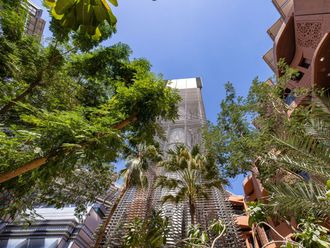Manama: Bahrain’s justice minister on Monday said that he would not be drawn into a “malicious interpretation” of the parliamentary by-elections voter turnout figures.
“No-one can doubt in the legitimacy of the Bahraini parliament, particularly that it has the backing of 51.4 per cent of the eligible voters,” Shaikh Khalid Bin Ali Al Khalifa said. “This figure is quite high compared with other countries where democracy is deeply-rooted. The rate of the boycott was merely 16.3 per cent and the statements made by some people on this issue meant to mislead public opinion,” he told the media at a press conference two days after by-elections were held in 14 constituencies.
Bahrainis were scheduled to elect 18 new MPs who will replace the lawmakers who represented Al Wefaq and who resigned in late February from the 40-member lower chamber to protest against the way the authorities handled demonstrators.
Five candidates carried their constituencies and joined four others, including a woman, who won their seats for lack of competitors. The remaining nine will be elected on Saturday in the second round after failing to secure the 50 per cent needed to reach the lower chamber.
Al Wefaq and other opposition formations boycotted the by-elections, saying that the lower chamber was not representative of the people and needed to have more powers. Leaders urged supporters and followers not to cast ballots in a sign of dissatisfaction with the elections.
“There were attempts to sabotage the elections process and they failed, then there were attempts to impose a boycott of the polls and they failed too. We now have people presenting misleading figures as an excuse for the repeated failures,” Shaikh Khalid said at the press conference.
The oppositions said that only 17 per cent of the voters went to the polling stations, giving a boycott rate of 83 per cent.
The rate was calculated based on the figures posted by the elections website, the opposition said.
However, Shaikh Khalid said that the figures should be based on the overall formation of the lower chamber and that the by-elections could not be considered as the general elections.
“We had a 67 per cent participation rate in October 2010 when we had the general elections, but now the figure for the lower chamber is 51.4 per cent,” he said.
“In 2010, the voting bloc was 318,688. The number of eligible voters in the 18 constituencies where the 18 lawmakers had resigned was 181,238. Even with the addition of 5,842 new voters, they cannot substitute for the national bloc eligible to elect the 40 members of the lower chamber. We cannot ignore either in any calculation the voters in the four constituencies where there was no voting because the four candidates who won were unopposed,” the minister said.












